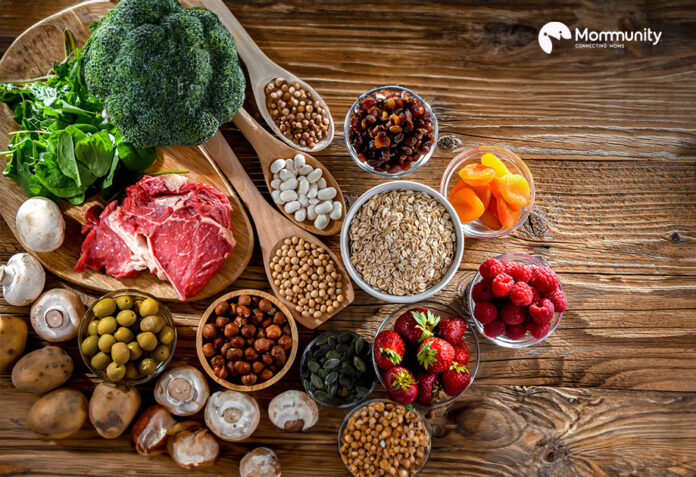What do you think makes Iron Man so powerful and strong? Want to make your kid as strong as Iron Man? Then feed them iron-rich foods for babies. Iron is a vital mineral essential for your baby’s growth and development. It helps carry oxygen throughout the body, supporting brain function, energy levels, and overall health.
As your baby grows from breast milk or formula to solid foods, introducing them to iron-rich foods becomes important. In this blog, let’s explore the best iron-rich foods for babies.
Why is Iron Important for Babies?
Iron deficiency anemia is a condition caused by insufficient iron levels. It can affect your baby’s development. There are a few symptoms that may include fatigue, irritability, and poor appetite. Providing your baby with iron-rich foods is essential to prevent this condition.
When to Introduce Iron-Rich Foods
You can start introducing iron-rich foods to your baby around 6 months of age when they are ready for solid foods. Always consult your pediatrician before starting any variations in food.
Best Iron-Rich Foods for Babies
Make sure your baby receives the iron they need for healthy growth and development. It’s essential to introduce a variety of iron-rich foods into their diet. A diverse range of options will not only provide essential iron but also introduce your baby to different flavors and textures.
Meat, Poultry, and Fish
- Iron-rich meats
Offer a variety of lean meats like beef, chicken, turkey, and pork. These are excellent sources of heme iron, which is easily absorbed by the body.
- Fish
Fatty fish like salmon and tuna contain iron and omega-3 fatty acids, beneficial for brain development. Always consult your pediatrician about introducing fish due to potential mercury levels.
Iron-Fortified Cereals
- Infant cereals
Look for iron-fortified infant cereals as a convenient and nutritious option. These cereals provide a good starting point for iron intake.
Legumes
- Lentils, chickpeas, and beans
These plant-based protein sources are rich in iron. While they contain non-heme iron, which is less readily absorbed, combining them with vitamin C-rich foods can enhance iron absorption.
Iron-Rich Vegetables
- Dark leafy greens
Spinach, kale, and broccoli are excellent sources of iron. However, these vegetables can be challenging for babies to digest. Introduce them gradually and in small amounts.
- Other iron-rich vegetables
Peas, sweet potatoes, and pumpkins also offer iron benefits.
3 Tips for Increasing Iron Absorption
To help your baby absorb the maximum amount of iron from their diet, consider incorporating these helpful tips into your feeding routine:
To help your baby absorb the maximum amount of iron from their diet, consider incorporating these helpful tips into your feeding routine:
- Pair with vitamin C
Foods rich in vitamin C, such as citrus fruits, strawberries, and tomatoes, increase iron absorption.
- Avoid milk interference
Excessive milk consumption can interfere with iron absorption.
- Cook in iron cookware
Cooking acidic foods like tomato sauce in iron cookware can increase iron content.
Creating Iron-Rich Meals for Your Baby
To make mealtime exciting and nutritious for your baby, consider these delicious and iron-rich meal ideas:
- Iron-fortified cereal with mashed banana and a sprinkle of iron-rich powdered formula.
- Pureed lentils with sweet potato and a dollop of yogurt.
- Mashed chickpeas with spinach and a squeeze of lemon juice.
- Chicken or beef puree with iron-fortified rice cereal.
Safety Considerations
-
Choking hazards
It’s important to make sure that all foods offered to your baby are prepared and served in a way that minimizes the risk of choking. This means cutting food into appropriately small pieces and choosing textures that are suitable for your baby’s age and chewing abilities. Always supervise your baby while they are eating.
-
Allergies
When introducing new foods to your baby, it’s important to take a doctor’s advice. Start by offering one new food at a time, allowing a few days between each introduction. This helps you identify any potential allergic reactions and pinpoint the specific food causing discomfort.
Monitor your baby closely for signs of allergies, such as hives, swelling, or digestive upset. If you notice any adverse reactions, discontinue the food and consult your pediatrician.
In the end, iron-rich foods for babies are essential for their overall growth. By adding a variety of iron-rich foods into your baby’s diet, you’re laying the foundation for a strong and healthy future. Remember, every baby is unique, so it’s essential to introduce new foods gradually and monitor their response.
With a little planning and creativity, you can create delicious and nutritious meals that your baby will enjoy. By prioritizing iron-rich foods, you’re empowering your little ones with the energy and vitality they need to thrive.




